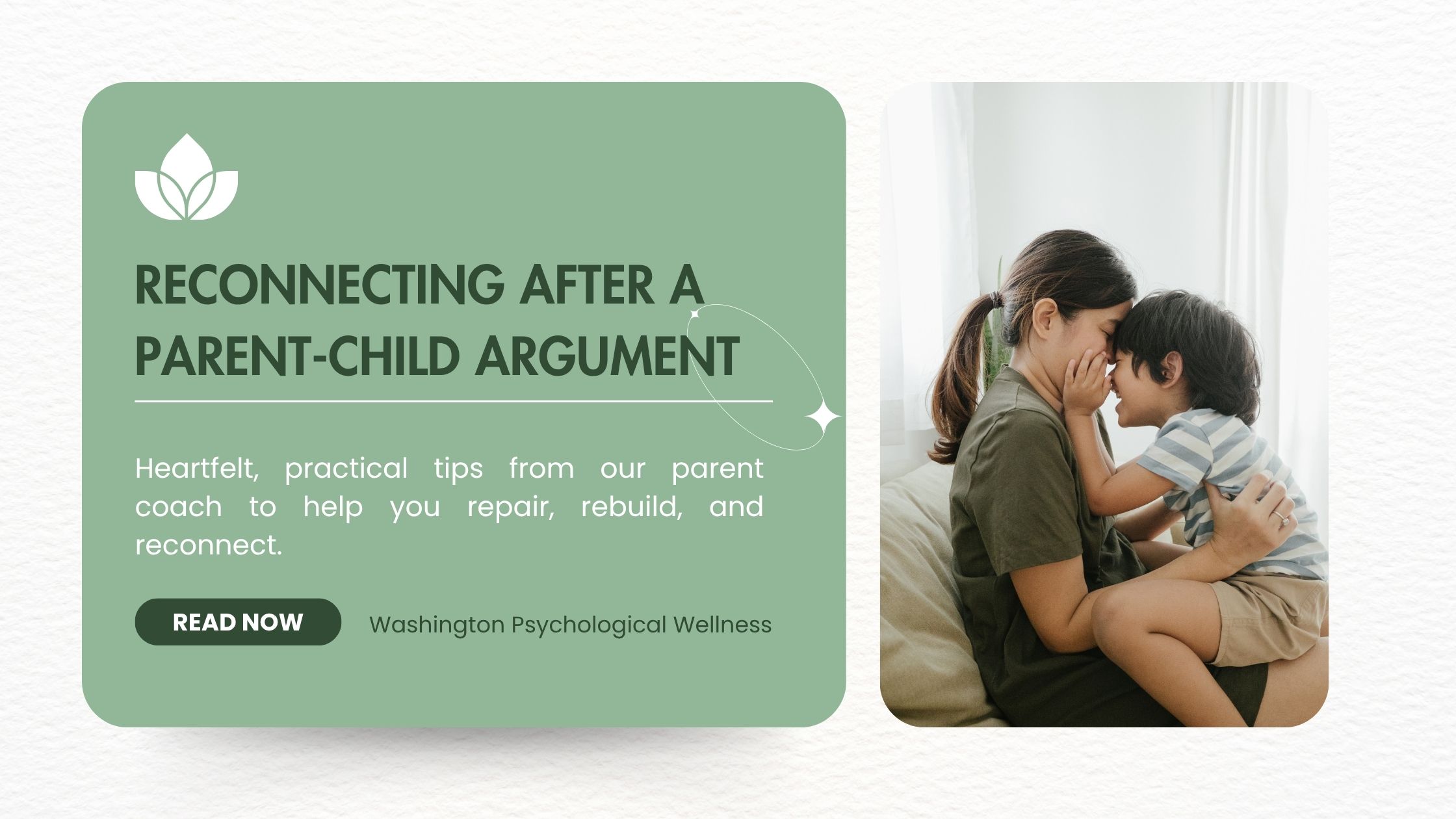
How to Reconnect with Your Child After an Argument
By Washington Psychological Wellness | Serving Montgomery County, with offices in Rockville, and Gaithersburg, MD
We’ve all had those moments—your voice rises, your child storms off, and suddenly the connection between you feels like it’s vanished. Whether it’s a toddler tantrum or a teen shouting match, arguments happen. But what you do after the blow-up is what matters most. Reconnecting after a disagreement is your chance to model emotional intelligence, teach resilience, and show your child that love doesn’t disappear with conflict.
No matter your child’s age, it’s never too late to repair and rebuild. Here’s how to reconnect with your child after an argument—so you both come out stronger.
Aswering the Question: How can You Reconnect with Your Child After an Argument?
Every person’s mental health journey is unique. One of the first things to look for in a therapist is whether they specialize in the concerns you’re facing. While all licensed therapists receive training in general mental health care, many focus on particular areas of practice.
Some clinicians work primarily with clients experiencing anxiety, OCD, or trauma. Others may specialize in couples counseling, family dynamics, or support for adolescents and children. Additionally, some therapists may focus on supporting individuals through grief, identity exploration, or major life transitions.
1. Take a Breath—Literally
Before you rush into a conversation, pause. Take a deep breath and ground yourself. Your calmness is contagious. A few minutes of space can help both you and your child settle enough to approach the moment with clarity instead of reactivity.2. Make the First Move
Waiting for your child to “come around” might only delay healing. When you reach out first, you show your child what it looks like to own your emotions and prioritize the relationship. A simple: “I’m sorry for how I handled that earlier. Can we talk?” goes a long way in opening the door to reconnection.
3. Listen Without Jumping In
Give your child space to share their side—without correcting or defending your own. You might hear something hard, but this is the foundation of trust. Try saying: “That sounds really frustrating. I’m glad you told me.” Validating their emotions doesn’t mean you’re agreeing with every action—it means you’re showing them you care about how they feel.
4. Repair the Relationship, Not Just the Rules
Parenting isn’t just about correcting behavior—it’s about connection. Use open-ended questions to understand the why behind the behavior:- “What were you feeling when that happened?”
- “What would help next time?”
5. Don’t Forget the Power of Play
Sometimes the best way to reconnect isn’t with words—it’s with shared time. Drawing, playing a game, going for a walk, or baking together can dissolve tension and create opportunities for natural conversation. Even older kids often respond to connection through activity.
6. Get Support When You Need It
If arguments are becoming more frequent or more intense, or if you’re unsure how to rebuild the relationship, parent coaching can help. At Washington Psychological Wellness, our certified parent coach works with caregivers to reduce stress, resolve conflict, and restore harmony at home—one conversation at a time.
We provide both in-person and virtual parent coaching in Montgomery County, MD to support families navigating every stage of parenting—from early childhood through adolescence.
Looking for a Parent Coach in Gaithersburg or Rockville, MD?
You don’t have to navigate parenting challenges alone. At Washington Psychological Wellness, we’re here to help you reconnect, rebuild trust, and feel more confident in your role as a caregiver.
Visit our Meet the Team page to learn more about our counseling and coaching services—or book a complimentary 15-minute consultation today and take the first step toward creating more peace in your home.
